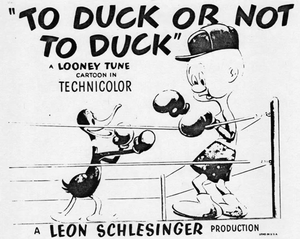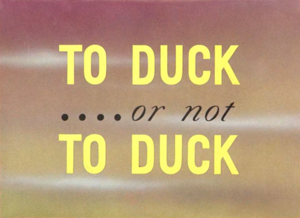To Duck... or Not to Duck
From Looney Tunes Wiki
Jump to navigationJump to search
| To Duck... or Not to Duck | |
|---|---|
 Lobby card. | |
| Production company | Leon Schlesinger Productions |
| Distributor | Warner Bros. Pictures The Vitaphone Corporation |
| Release date | March 6, 1943 |
| Starring | Mel Blanc Arthur Q. Bryan |
| Producer(s) | Leon Schlesinger |
| Music composition | Carl W. Stalling |
| Story | Tedd Pierce |
| Animation | Robert Cannon |
| Director(s) | Charles M. Jones |
| Series navigation | |
| ← Previous | Next → |
| Title card | |

| |
To Duck... or Not to Duck is the one hundred and seventy-eighth Looney Tunes theatrical short. It was distributed Warner Bros. Pictures and The Vitaphone Corporation on March 6, 1943. It was written by Tedd Pierce, produced by Leon Schlesinger and directed by Chuck Jones.
After being shot clear out of the sky, Daffy Duck, insulted by his reason of "fair play," settles things with Elmer by pitting against him in a rigged boxing match.
Detailed summary
Memorable Quotes
Elmer: I'm not the one compwain, Mr. Weferwee. But I thought you said no wough stuff.
Characters
In order of appearance: | ||||||||||
| ||||||||||
Locations
- Earth
- United States
- Duck pond
- Boxing arena
- United States
Objects
- Elmer's hunting rifle
- Boxing gloves
Vehicles
- None
Music
The music for this cartoon was composed by Carl W. Stalling.
The title music used for this cartoon is based on the song, "A Hunting We Will Go".
Release
Dates are in order of release:
- United States: March 6, 1943
Behind the scenes
- The title is a pun of a quote from William Shakespeare's play Hamlet, "To be or not to be." This quote would once again be used as another pun in the 1963 Merrie Melodies short, To Beep or Not to Beep.
- This is the first Looney Tunes cartoon to feature both Daffy Duck and Elmer Fudd.
- This is also the first proper appearance of Elmer Fudd in a Looney Tunes short, not counting his voice being heard in Nutty News.
- The duck referee is intended to be the same plump and jovial referee from Count Me Out. In that short, the referee was voiced by Tex Avery, while here the referee is voiced by Mel Blanc, since Avery had already left Warner Bros. for MGM at the time the latter cartoon was made.
- The cartoon entered the public domain in 1971, as United Artists (successor-in-interest to Associated Artists Productions) failed to renew the copyright in time.
Legacy
- The referee would later appear in The Sylvester & Tweety Mysteries episode "Furgo," where he is named Ducky Wheeze.
- Daffy's boxing persona would be reused in the video game Looney Tunes: World of Mayhem.